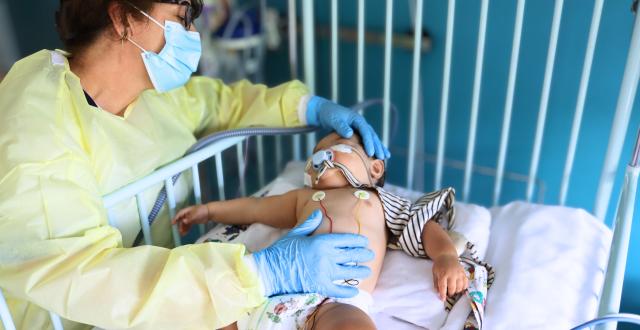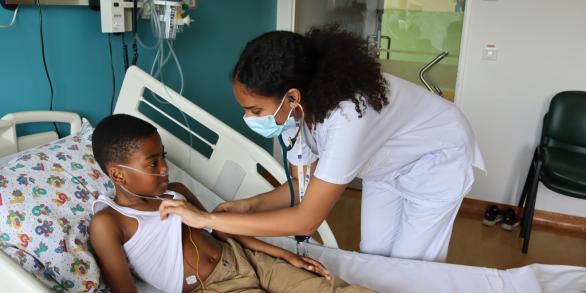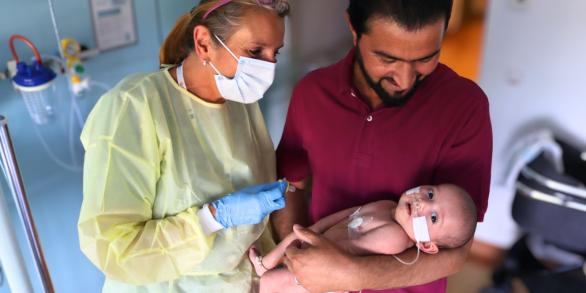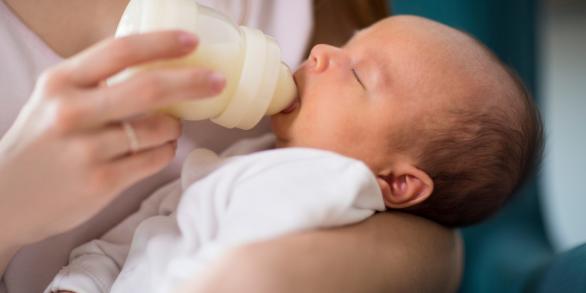We're hiring ! Join us and make a difference in our hospitals
Baby Unit

Une prise en charge globale et bienveillante de la dyade parent-enfant, dans un environnement adapté et sécurisé
Un environnement pensé pour les tout-petits… et leurs parents
The “Baby Unit” welcomes babies from 0 to 2 years old, as well as young children requiring hospital admission and diagnostic evaluation for acute, chronic or postoperative conditions.
Each room is private and equipped with a bed for one parent, enabling cohabitation day and night, and supporting the essential attachment bond at this stage of life. A playroom and a kitchenette are available to families, providing a warm and reassuring environment. Educators visit the unit twice a week, and hospital clowns bring joy to the children every week. In cases of prolonged hospitalisation, children can attend lessons at the hospital, in collaboration with the Robert Dubois School.
The unit works closely with the non-profit Les Câlineuses de bébés, whose volunteers provide relief when parents need to rest.
Welcoming families is central to our care approach, with a focus on building the care pathway together.
Bienvenue à l'Unité Nourrisson

Nursing expertise in acute and developmental care
The nursing team provides close monitoring (vital signs every 4 hours), centralised monitoring (for apnoea, distress, arrhythmia…), and attentive care tailored to the specific needs of very young children.
During the winter, the unit sees a high number of bronchiolitis cases. It is equipped with high-flow nasal cannula (HFNC) systems and has developed strong expertise in their use: improved respiratory comfort, better tolerance for the infant, and continuous monitoring. Young paediatricians receive regular training to ensure high-quality care.

A holistic approach: prevention, support and partnership
Parent training: basic care (holding, hygiene and feeding), post-operative care (e.g., cleft palate), and tailored feeding support in cases of aversion or feeding difficulties
• Support for breastfeeding, with assistance from a lactation consultant
• Parental support: screening for postnatal depression, child abuse prevention in partnership with SOS Enfants. A psychologist and a dietitian visit each room on a regular basis
• Systematic preventive screening: monitoring of growth delays, delayed vaccinations, and developmental issues
Collaboration
The unit works in close collaboration with various specialist teams across the hospital, including:
• The Emergency Department
• Outpatient consultations
• The Operating Theatre for postoperative follow-up (notably cleft palate surgeries, managed by a trained team led by Dr Diane Franck)
• Paediatric Intensive Care (PICU)
• Neonatology for ongoing care after transfer from the neonatal centre
• Haemato-oncology and other inpatient units at the Children’s Hospital
• Psychosocial units (Parent-Baby Unit, Child Psychiatry, Social Services), for example in cases where parents are too exhausted or face difficulties in caring for their baby
This seamless coordination ensures continuity of care, even for complex cases: extremely premature infants, children with cardiac or gastrointestinal conditions, children with cerebral palsy (CP), those in palliative care, etc.
Pain management adapted to the child’s age is also a recognised area of expertise at the Children’s Hospital.

FOCUS: Managing malnutrition
At the Baby Unit, managing feeding disorders and malnutrition in babies and young children is a key focus of care, as this issue is clearly on the rise. The unit offers comprehensive multidisciplinary assessments to identify the underlying causes of feeding difficulties—such as sucking and swallowing disorders, gastroesophageal reflux, or ENT-related conditions.
A high-quality multidisciplinary approach
Our teams collaborate daily with all specialists at HUDERF to deliver holistic, tailored care that addresses the medical, nutritional, psychological and social needs of each child.
Following hospital discharge, the Baby Unit also supports families by helping them plan outpatient follow-up appointments at the hospital.
Each hospital stay is an opportunity to care for the whole child, support the family, and lay the foundations for healthy, harmonious development.